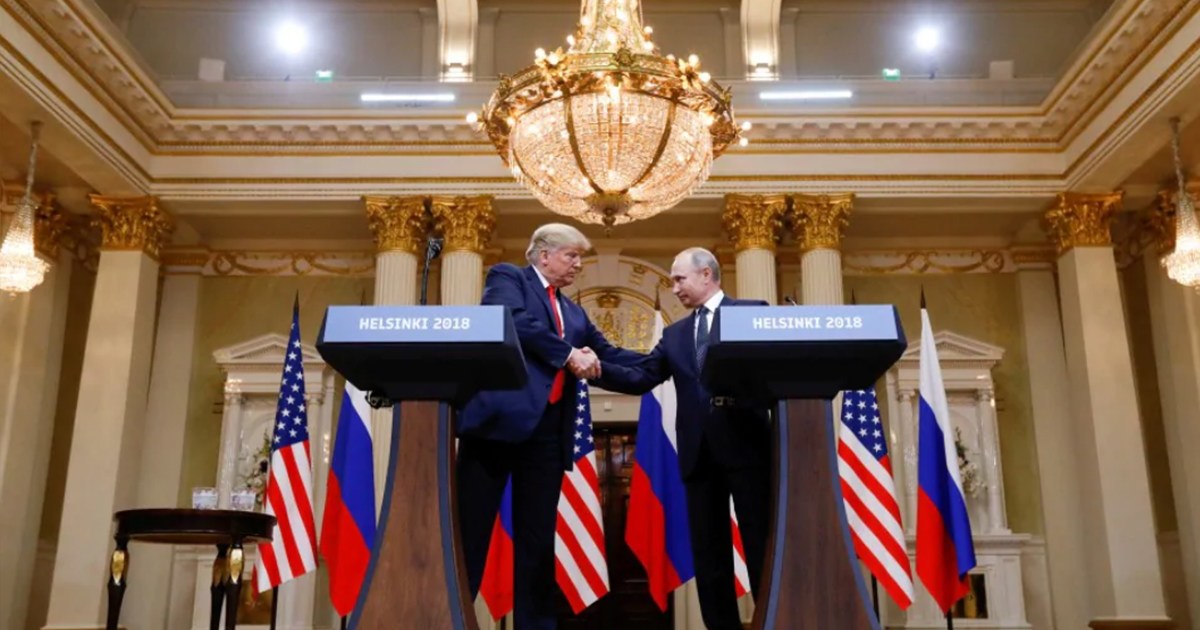Nathan Gardels is the editor-in-chief of Noema Magazine.
The “America First” president who denigrates democratic allies as foes is no longer the leader of the free nor, without them, of the world. Whatever truth there may be in the obsolescence of NATO or the free-riding of the European Union, to diminish America’s allies is to diminish its own influence in the world. The world order President Trump seems to envision is one of grand spheres of influence apportioned to the United States, China and Russia. If the Helsinki summit this week is any indication, what differentiated the United States on the world stage no longer does. Trump’s America is a solely self-interested big power just like the others.
Further, by ranking the integrity of U.S. institutions below the “who, me?” protestations of Russia’s wily autocratic leader, Trump appears to be not even the leader of the United States, but only of his own partisan base still obsessed with Hillary Clinton’s emails.
Writing in The WorldPost from St. Petersburg, Ivan Kurilla picks up on this latter aspect and puts Trump’s performance at the Helsinki summit in the context of his primary battlefield: the American culture wars. “Since the end of 2016, Americans have been engaging in a new exacerbation of old conflicts about race, gender, monuments to Confederate history and other divisive issues. One might call them culture wars. In these political and cultural debates, I see Russia as playing the role of the ‘other.’”
He goes on: “In the view of many Trump supporters, the facts exposed by the FBI and special counsel Robert Mueller’s investigation are just not important. What is important is the question of who provides information about the investigation — and why — to the press. Trump supporters’ answer is that there is an anti-Trump political and media establishment using Russia to obstruct Trump’s presidency. That is why in Helsinki, Trump hoped to make his worldview prevail and win the culture wars against liberal America. He certainly could not concede to his opponents and proclaim Russia an enemy.”
The downgrading of America’s leadership role is a boost for Putin and a sign of the no-bones realpolitik order toward which global relations are headed. In his assessment of the Helsinki summit, former Swedish prime minister Carl Bildt writes: “Any reasonable Kremlin interpretation would be that Russia can go on pursuing its policies without significant White House objection. The bilateral relationship went from very bad to very good in those four hours without Russia announcing any concessions or course correction whatsoever.” As Bildt sees it, Putin stood by his positions — on Crimea, American election meddling and poisoning ex-KGB agents abroad — “while Trump hardly challenged any of them and directed his fire and fury against his own country.”
To allies like Poland who have relied on NATO’s American-led security guarantee to sleep peacefully at night in the shadow of a Russia that has already broken the post-World War II taboo of seizing territory by force in Crimea, Trump’s unsettling behavior is a stark wakeup call. “After last week, we have to face the reality that we do not know — because even the U.S. State Department, the Pentagon and Trump’s own National Security Council do not know — what Trump would do in a security crisis with Russia. Perhaps he doesn’t know himself,” Radek Sikorski writes from Chobielin, Poland.
“This does not mean the end of NATO,” says the country’s former foreign minister. “Our alliance should continue, and indeed European allies should spend more money on defense — as successive U.S. presidents have advised — and hope that no crisis materializes. But it does mean that the European Union needs its own autonomous ability to defend itself. We need it for the southern strategic direction, where refugee flows have threatened our political stability. We need it in the east, where Russia has broken the post-World War II taboo of changing borders by force. And we need it because the president of the United States is unreliable.”
Finally, Fabrizio Tassinari and Miguel Poiares Maduro examine yet another angle of the rapidly changing equation: the alignment of populist movements and governments in Europe with both Trump and Putin.
“From Hungary’s Prime Minister Viktor Orban and France’s Marine Le Pen to the United Kingdom’s Nigel Farage and Italy’s new interior minister Matteo Salvini, populists across the continent see Putin and Trump as the standard bearers on matters of protectionist, nationalist and anti-immigrant policies, ideology and style,” they write from Fiesole, Italy. “Indeed, the idea of ‘sovranismo’ or ‘sovereignism’ frequently used in Italy to describe the positions of the current governing coalition of the Five Star Movement and League party closely parallels Putin’s idea of ‘sovereign democracy’ — in effect, another name for the illiberal democracy of nationalist majoritarian rule. All share a disdain for the practices and premises of European integration and appear determined to undermine them from within. They are eager to engage Putin’s Russia and Trump’s America as a way to legitimize their own political standing and as a counterweight to Europe’s weaknesses.”
For Tassinari and Maduro, Europe’s populists are leading the continent into a dead-end cul de sac. “The anti-globalization backlash doesn’t change the fact that the traditional nation state has proven inadequate to contain the pervasive reach and depth of technology, trade, corporations, information and media,” they contend. “The zero-sum transactional worldview of Trump or Putin may indeed radically transform the way America or Russia position themselves at home and abroad. But it is unlikely to benefit anybody else. Understanding and responding to the realities of transnational governance is an imperative, even in a populist Europe.”
This was produced by The WorldPost, a partnership of the Berggruen Institute and The Washington Post.





